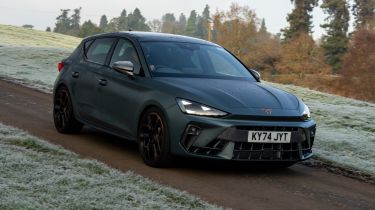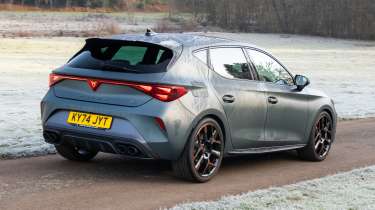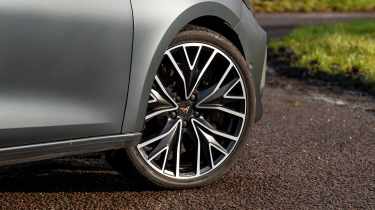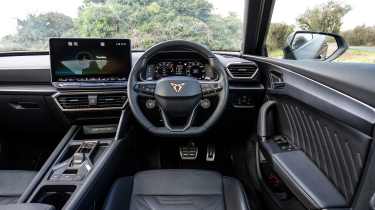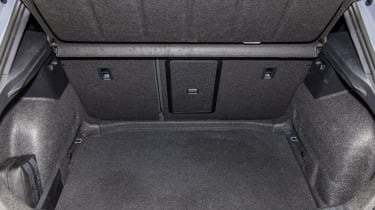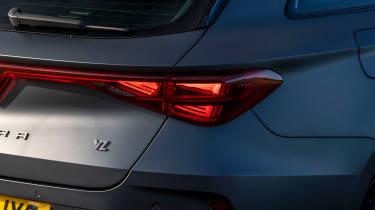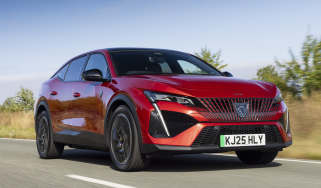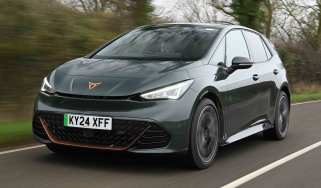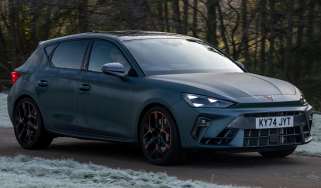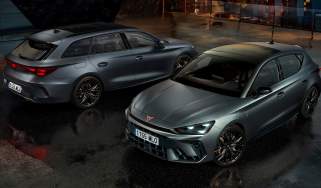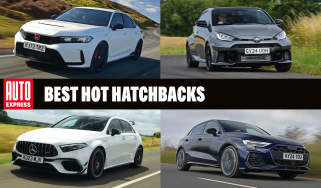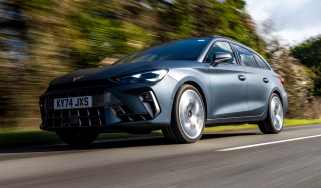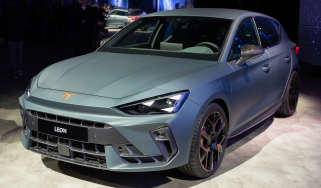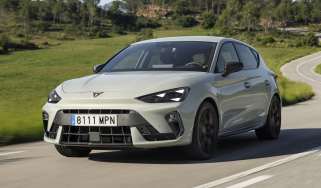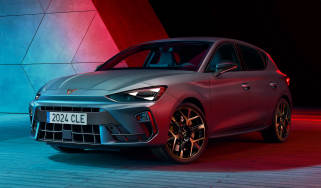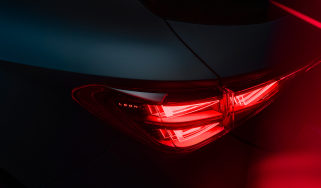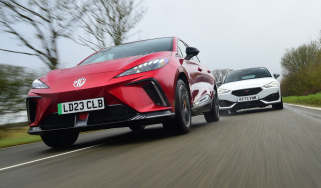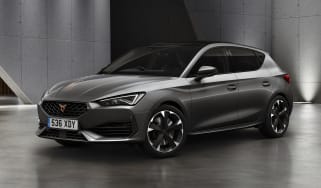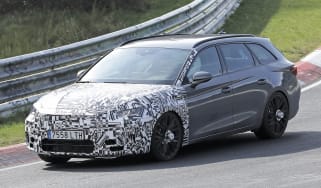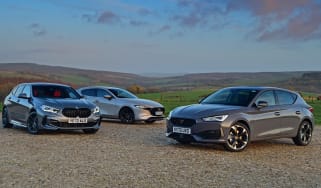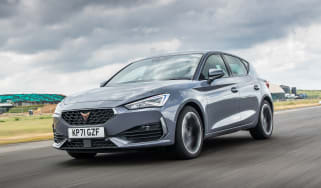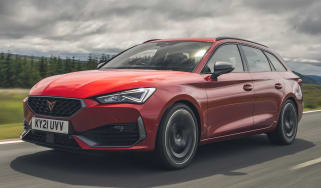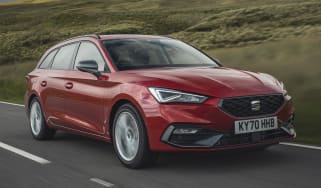Cupra Leon review
More eccentric than most rivals, Cupra’s updated Leon is a solid package with some impressive powertrains
Is the Cupra Leon a good car?
The Cupra Leon doesn’t break any boundaries, but plays the role of a Volkswagen Golf’s eccentric Spanish cousin well. It’s a more engaging and high-spec operation than many in the class, and offers a range of high-performance engines that give it a leg up against most of the competition. However, the top-spec petrol Leon isn’t quite a hot hatchback leader, leaving plug-in hybrids as the more interesting alternative. Top-spec cars can get pricey, though, taking it into the premium space.
| Key specs | |
| Fuel type | Petrol, mild-hybrid, plug-in hybrid |
| Body style | Five-seat hatchback, estate |
| Powertrain(s) | 1.5-litre four-cylinder, 2.0-litre four-cylinder petrols; 1.5-litre four-cylinder PHEV |
| Safety | 5* |
| Warranty | 5 year/90k |
How much does the Cupra Leon cost?
A lot, it seems. As part of the Leon’s promotion from SEAT to Cupra, the base price of the hatchback has risen to more than that of a rival Golf, and in most cases more than an Audi A3, too.
Kicking off at £31,770 for an entry-level V1 with a 1.5-litre four-cylinder engine and six-speed manual, this is nearly £2,000 more than an equivalent SEAT Leon in its sportier FR trim, a few hundred more than a Mk8.5 Golf in its sporty R-Line trim and a tenner more than an Audi A3. Standard equipment is good, but no better than most key rivals, and while there are few individual options, equipment upgrades are generally organised into trim levels named V2 (+£2,345) and V3 (+£5,955).
Used - available now
Next up in terms of engines is a £33,630 eTSI mild-hybrid with a seven-speed dual-clutch ’box and £38,940 200bhp e-Hybrid, both available in the three tiers of specification.
High-powered 300TSI and 272 e-Hybrid models gain their own ‘VZ’ trims that feature their own equipment and design elements. These start at £42,075 for the hybrid and £42,130 for the top-spec petrol, with a £2,560 premium for the VZ2 and £5,955 for the VZ3. This top trim with the most powerful engine brings the price close to £49,000, but it does include high-end goodies such as bucket seats and Akebono brakes.
VZ3 pushes the Leon way over the price of key rivals, though, with the Volkswagen Golf R costing from £44,535. If you add the optional kit on the Golf to bring it up to the same level as the Leon VZ3, the price evens out, but long story short, the Cupra is not the cheaper option.
Engines, performance & drive
Engines are broadly carry-overs from the previous generation, with 1.5 TSI and eTSI (mild-hybrid) 148bhp entry-level derivatives, and a 2.0-litre four-cylinder turbo unit sticking around at the top. The estate model – Sports Tourer – benefits from the lusty 328bhp motor and 4Drive all-wheel drive, which has recently found its way into the Audi S3 and Volkswagen Golf R. The front-driven hatchback sticks with the 296bhp iteration of the same unit.
In truth, a Leon 300 2.0 TSI feels a little off the hot-hatch pace these days. It’s not the most tuneful version of the EA888 engine you’ll ever encounter, with a flat growl about the most noise it ever makes. And while it does everything dynamically well, by the same token it doesn’t really do anything exceptionally.
Which is why we reckon the new 1.5 eHybrid might be the Cupra Leon to aim for. Despite being saddled with 212kg of additional bulk compared to the 296bhp TSI, it steers and handles every bit as well as the plain petrol model. If anything, it rides with a bit more grace because it’s not trying to suspend the unsprung mass of larger 19-inch alloy wheels.
It's also a surprisingly spry performer, at odds with an on-paper 0-62mph time that’s 1.4 seconds behind the 2.0-litre car. With 330Nm of torque on tap from its electric motor at all times, and a system max of 400Nm spread across a broad plateau from 850-4750rpm, the Leon eHybrid never feels thin on power; something helped by an increase from 242bhp previously to a more robust 268bhp in the facelifted model.
Admittedly, there are times when the 1.5 can become a bit coarse, specifically at higher revs. But until you’ve breached 5,000rpm it feels smoother and sounds a lot quieter than the 296bhp TSI. And because we don’t think the revised flagship is the class-leading hot hatch, the sweeter eHybrid is a better fit for the Cupra Leon’s character.
| Model | Power | 0-62mph | Top speed |
| Cupra Leon 1.5 eTSI | 148bhp | 8.9 seconds | 134mph |
| Cupra Leon 2.0 TSI | 296bhp | 5.7 seconds | 155mph |
| Cupra Leon 1.5 e-Hybrid | 200bhp, (268bhp) |
7.7 seconds (7.1) |
137mph (142mph) |
MPG, CO2 & running costs
The larger 19.7kWh battery pack in the eHybrid has resulted in an official electric range of more than 73 miles, which leads to some wildly skewed on-paper fuel economy figures.
So it’s better to focus on Cupra’s own ‘charge-sustaining mode’ figures, which are more like 51.4mpg than 700mpg-plus. Our experience on a mixed test route saw the Leon eHybrid 272 manage a commendable 74.3mpg; we’d expect 50mpg-plus to be realistically attainable with only occasional charging cycles.
The petrol models aren’t quite so efficient, with the base 148bhp model hovering around the mid-to-high 40s in day-to-day driving. Stick to motorways and you’ll be able to break the 50mpg mark, and thanks to an effective engine start-stop system, it doesn’t decrese much in traffic.
The pure 2.0-litre engine isn’t quite so clever, but will still average high 30s, and even be able to sneak over 40 on longer runs. However, its in-town efficiency isn’t great so these figures will deteriorate in traffic. Drive it at pace and this will also drop the economy figures.
Most Leons in the UK run on Hankook Ventus rubber, which has a relatively low wear rating, so will last a decent amount of miles and not cost the earth to replace.
| Model | MPG (range) | C02 | Insurance group |
| Cupra Leon 1.5 eTSI | 44.8-48.7mpg | 131g/km | |
| Cupra Leon 2.0 TSI | 37.3mpg | 173g/km | |
| Cupra Leon 1.5 e-Hybrid 204PS (272PS) | 744.4mpg (706.2mpg) | 9g/km |
Design, interior & technology
Looks are subjective, so we’ll leave it up to you as to what you think of the smoothed-off nose with its triangular-LED headlights. We think it looks a little fussy, but adds some welcome drama to the range. We bemoaned the previous generation for looking a little too much like the standard Seat variant.
The same new look hasn’t quite been carried across the rest of the body, though, because its relatively subdued surfacing and rear end are slightly out of kilter with the more aggressive nose. The rear light bar helps, though, with more complex layered LED internals and an illuminated rear badge; overall we think it helps sharpen up the overall design. Many of the new 19-inch wheel designs also do well to up the visual drama thanks to copper accents and triangular spoke arrangements.
Inside, it’s the same high-quality Leon cabin as before, still with Cupra’s trademark copper-tinged details and a greater content of ecologically sound materials, such as 73 per cent recycled microfibre for the seat upholstery. Top-specification VZ3 models pick up a superb set of rigid-back bucket seats, and all the materials and trims come in an interesting array of dark greys, blacks and even purples that give the otherwise pretty subtle interior some real interest.
Sat-nav, stereo and infotainment
Inside, the infotainment system has been given an overhaul, with a larger 12.9-inch screen and the latest MIB4 operating system. It works a little better than it used to, although the climate control functions are still on the touch-sensitive display, which can make them fiddly to use when you’re on the move.
There are shortcuts that remain on screen at all times. The lower bar’s climate controls pretty much handle everything commonly needed without needing to click onto the climate-dedicated screen, including the heated seats and fan control. At the top of the screen sits two ‘home’ screen options, plus quick access back to Apple CarPlay, parking assistance and the drive modes. Between them is your main screen, and whether using a phone mirroring system or the car’s embedded interface, it’s easy to use and quick to respond. We think the screen might even be a little too big considering the seating position, but generally the tech package is very good.
Boot space, comfort & practicality
|
Dimensions Hatchback | |
| Length | 4,398mm |
| Width | 1,799mm |
| Height | 1,444mm (1,412) |
| Number of seats | five |
| Boot space | 380 litres |
The Cupra Leon’s rear seats are fairly average for the class, with legroom and headroom somewhere near the middle of the class. The dark colours and rooflining make it feel more claustrophic than it is, but the sunroof on both the hatchback and estate will help lighten things up.
The flipside of the tight rear legroom, though, is the boot capacity, which is actually above average for the class. The 380-litre boot is bigger than you’ll find on an equivalent Audi A3 and on par with the Golf, and comes with both a ski-hatch and 30:70 split folding rear seats. The ST estate is even bigger, with a colossal 620 litres of space.
Ride comfort isn’t quite the top priority for Cupra models, and this can be seen in the car’s firm ride and relative lack of refinement. It’s not a dealbreaker, though, and for many the added engagement and control for the driver will be a worthwhile compromise.
Safety & reliability
| Key standard safety features | Euro NCAP safety ratings |
|
|
The Leon has a full five-star safety rating from Euro NCAP, with high ratings for adult and child occupancy. It also got a decent pedestrian rating, and overall is a perfectly safe family car. In terms of reliability, the same general notes apply as many Golf-based models. This refers to the powertrains, which are generally reliable in all forms, with the caveat of the dual-clutch transmission. This will sometimes need to be changed after a few years at pretty high expense, and there can be other issues around the actuators.
Cupra Leon alternatives
Larger hot hatchbacks seem to be thin on the ground these days. There’s no longer a fast Renault Megane, and Hyundai has stopped making its brilliant i30 N.
Your choices, therefore, amount to the Ford Focus ST, the superb (but super-pricey) Honda Civic Type R, and then a whole load of Volkswagen Group models using much the same underpinnings.
Given the lack of competition, it mostly comes up against its key VW Group rivals such as the Golf GTI Clubsport and Audi S3. In both cases, the Leon holds up its own without actively being any better or worse. For the sharpest experience there’s the Honda Civic Type R, and Ford’s short-lived Focus ST Edition arguably has a little more attitude.
Lower down the order, most Leon’s are solid choices and offer a slightly more sporty and interesting take on the usual VW experience. If you value eccentric design and engaging handling, it’s a good option – especially if you want a super efficient plug-in hybrid.

